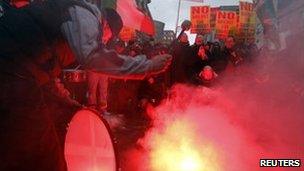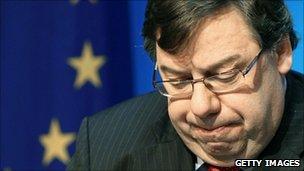Irish Republic's austerity budget passes first vote
- Published
Brian Lenihan announced an emergency budget intended to make £8billion dollars in savings next year
The toughest budget in the Republic of Ireland's history has narrowly passed its first parliamentary vote.
The Dail voted for planned tax rises by 82 to 77, with three more budget votes to follow in the coming days.
It came after Finance Minister Brian Lenihan laid out government plans for a shake-up of the income tax system and hefty benefit cuts in his 2011 budget.
"This budget is every bit as bad as we feared," said Eamon Gilmore, leader of the opposition Labour Party.
The first vote passed as expected, despite the Fianna Fail/Green party coalition's slim majority. There were no defections by coalition members of the Dail.
The 6bn euros (£5bn; $8bn) of cuts in the 2011 budget, external are part of a four-year 15bn-euro austerity plan designed to bring the country's deficit under control.
If the rest of the budget is cleared by parliament, it will trigger the first tranche of bail-out funds from the EU and IMF.
The IMF responded to the first vote by setting a board meeting for Friday to approve its loan.
Pension cut
Among the cost-saving measures announced by the minister were:
a plethora of benefit cuts including a 10 euros per month cut in child benefit
lower income thresholds for the standard rate of income tax
across-the-board cuts to tax credits, and phasing out of property-related tax reliefs
a single and more expensive "social levy" combining health insurance and social security
a 4% cut in current pensions for public sector pensioners
The finance minister called the Irish income tax system "no longer fit for purpose", pointing out that more than 45% of people were exempt from it.
Growth prediction
Mr Lenihan said that the Irish economy was already showing signs of recovery, and he expected growth to continue over the coming years, driven by exports.

There were protests outside the parliament while the budget was being announced
"It is the government's strong view that the economy can continue to grow while we carry out the... National Recovery Plan," said Mr Lenihan.
But rating agency Standard & Poor's - which cut the Republic's credit rating last month, external - said it expected virtually no growth over the next two years.
"The headline message is the numbers in the budget remain extremely optimistic about economic growth," said Neil Gibson, economic advisor at accountants Ernst & Young.
He thinks that the budget cuts could lead to slower growth, which would in turn worsen the government deficit.
Michael Noonan of the main opposition Fine Gael party doubted the government would achieve all of the planned budget savings, and told the Dail that his party might have to introduce a further emergency budget in 2011 if, as expected, it won elections due in the New Year.
Meanwhile, Mr Lenihan said the government would seek to boost growth further via an investment programme equal to 3.6% of the country's economic output.
He added that the state pension funds would also invest in public-private infrastructure projects.
Burden-sharing
In his speech, Mr Lenihan defended the government's decision to spare the major creditors to the country's banks from any losses on their loans.
It was a collapse in confidence in the government-guaranteed Irish banking system in November that triggered the Republic's bail-out.
He said the Irish government could not renege on its commitment to the banks "against the wishes of our European partners and European institutions".

Mr Cowen is accused of caving in to European pressure to foot the bill for rescuing Ireland's banks
The decision to spare the banks' lenders is thought to have been insisted on by the European Commission and European Central Bank (ECB) - but not the IMF - as they feared that failing to do so would trigger a Europe-wide banking crisis.
But many in the Republic - including the opposition parties - have been angered by the decision, which leaves Irish taxpayers footing the bill for saving the Irish banks.
Mr Noonan - who is likely to take over from Mr Lenihan as finance minister after the coming elections - said that he felt ashamed at letters sent to the IMF and ECB, and asked if the government had been "waterboarded" into signing them.
"This budget is the budget of a puppet government who are doing what they have been told to do by the IMF, the EU Commission and the European Central Bank," said Mr Noonan.